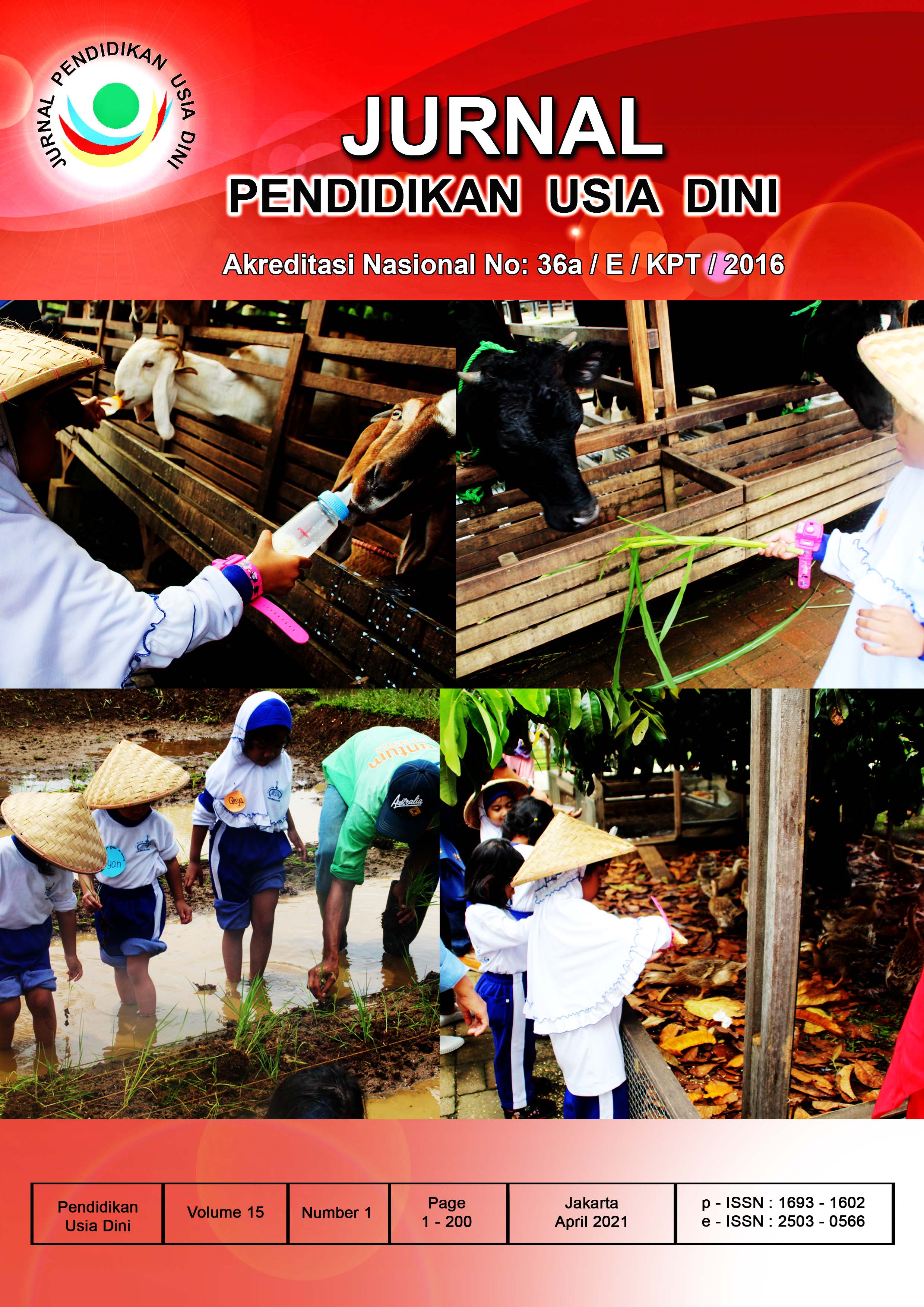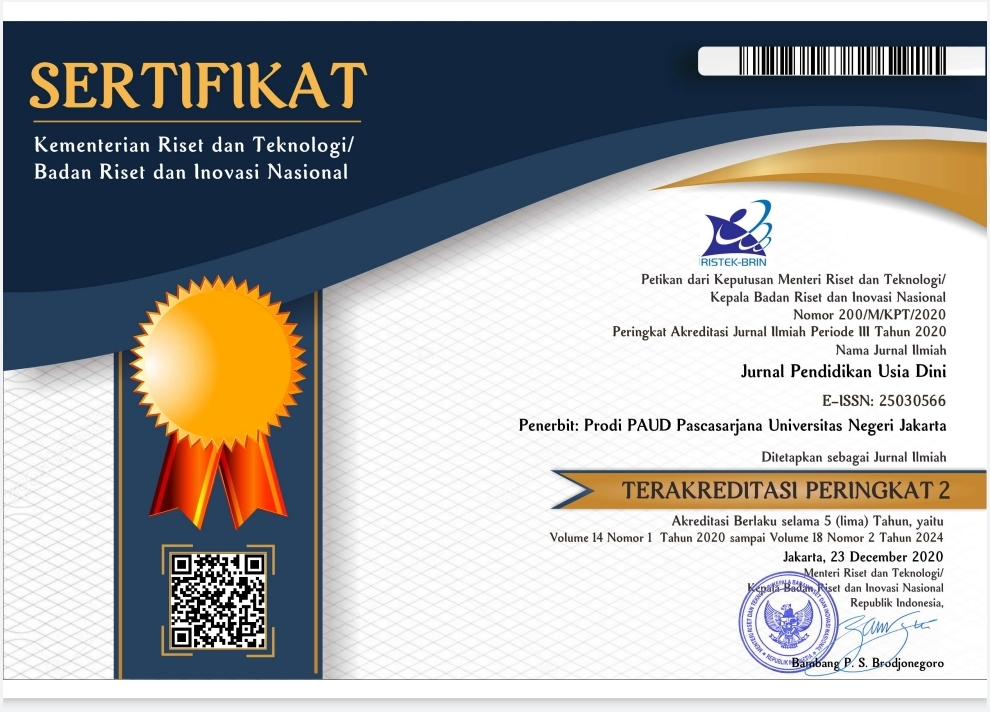Local Content Curriculum Model for Early Childhood Scientific Learning
DOI:
https://doi.org/10.21009/JPUD.151.05Abstract
Curriculum material is generally considered the subject matter of information, talents, dispositions, understandings, and principles that make up research programs in the field. At a more complex level, the curricula need to contain historical and socio-political strengths, traditions, cultural views, and goals with wide differences in sovereignty, adaptation, and local understanding that encompass a diversity of cultures, laws, metaphysics, and political discourse This study aims to develop a curriculum with local content as a new approach in early childhood science learning. The Local Content Curriculum (LCC) is compiled and developed to preserve the uniqueness of local culture, natural environment, and community crafts for early childhood teachers so that they can introduce local content to early childhood. Research and model development combines the design of the Dick-Carey and Dabbagh models with qualitative and quantitative descriptive analysis. The results showed that local content curriculum products can be supplemented into early childhood curricula in institutions according to local conditions. Curricula with local content can be used as a reinforcement for the introduction of science in early childhood. The research implication demands the concern of all stakeholders to see that the introduction of local content is very important to be given from an early age, so that children know, get used to, like, maintain, and love local wealth from an early age.
Keywords: Early Childhood, Scientific Learning, Local Content Curriculum Model
References:
Agustin, R. S., & Puro, S. (2015). Strategy Of Curriculum Development Based On Project Based Learning (Case Study: SMAN 1 Tanta Tanjung Tabalong South Of Kalimantan ) Halaman : Prosiding Ictte Fkip Uns, 1, 202–206.
Agustina, N. Q., & Mukhtaruddin, F. (2019). The Cipp Model-Based Evaluation on Integrated English Learning (IEL) Program at Language Center. English Language Teaching Educational Journal, 2(1), 22. https://doi.org/10.12928/eltej.v2i1.1043
Altinyelken, H.K. (2015). Evolution of Curriculum Systems to Improve Learning Outcomes and Reduce Disparities in School Achievement, in Background paper prepared for the Education for All Global Monitoring Report 2015.
Andrian, D. (2018). International Journal of Instruction. 11(4), 921–934.
Andrian, D., Kartowagiran, B., & Hadi, S. (2018). The instrument development to evaluate local curriculum in Indonesia. International Journal of Instruction, 11(4), 921–934. https://doi.org/10.12973/iji.2018.11458a
Aslan, Ö. M. (2018). From an Academician’ s Preschool Diary: Emergent Curriculum and Its Practices in a Qualified Example of Laboratory Preschool. 7(1), 97–110. https://doi.org/10.5430/jct.v7n1p97
Bakhtiar, A. M., & Nugroho, A. S. (2016). Curriculum Development of Environmental Education Based on Local Wisdom at Elementary School. International Journal of Learning, Teaching and Educational Research, 3(3), 20–28.
Barbarin, O. A., & Wasik, B. H. (2009). Handbook of child development and early education. Guilford Press.
Baron-gutty, A. (2018). Provision in Thai basic education”. March.
Bodrova, E. (2008). Make-believe play versus academic skills: A Vygotskian approach to today’s dilemma of early childhood education. European Early Childhood Education Research Journal, 16(3), 357–369. https://doi.org/10.1080/13502930802291777
Bohling-philippi, V., Crim, C., Cutter-mackenzie, A., Edwards, C., Desjean-perrotta, B., Finch, K., Brien, L. O., & Wilson, R. (2015). International Journal of Early Childhood. 3(1), 1–103.
Brooker, L., Blaise, M., & Edwards, s. (2014). The SAGE handbook of play and learning in early childhood. Sage.
Broström, S. (2015). Science in Early Childhood Education. Journal of Education and Human Development, 4(2(1)). https://doi.org/10.15640/jehd.v4n2_1a12
Childhood, E., Needs, T., & Han, H. S. (2017). Implementing Multicultural Education for Young Children in South Korea: Implementing Multicultural Education for Young Children in South Korea: Early Childhood Teachers’ Needs 1 ). March.
Dabbagh, N & Bannan-Ritland, B. (2005). Online Learning: Concepts, Strategies, and Application. Pearson Education, Inc.
Dahlberg, G., Moss, P., & Pence, A. (2013). Beyond quality in early childhood education and care: Languages of evaluation. Routledge.
Dahlberg, G., Moss, P., & Pence, A. (2013). Beyond quality in early childhood education and care: Languages of evaluation. Routledge.
Daryanto. (2014). Pendekatan Pembelajaran Saintifik. Gava Media.
Dick, C. & C. (2009). The Sistematic Design of Instruction. Upper Saddle River.
Elde Mølstad, C., & Karseth, B. (2016). National curricula in Norway and Finland: The role of learning outcomes. European Educational Research Journal, 15(3), 329–344. https://doi.org/10.1177/1474904116639311
Eurydice. (2018). Steering Documents and Types of Activities.
Farid, MN. (2012). Peranan Muatan Lokal Materi Batik Tulis Lasem Sebagai Bentuk Pelestarian Budaya Lokal. Jurnal Komunitas, 4(1), 90–121.
Fisnani, Y., Utanto, Y., Ahmadi, F., Tengah, J., Technology, E., Semarang, U. N., Education, P. T., Semarang, U. N., & Info, A. (2020). The Development of E-Module for Batik Local Content in Pekalongan Elementary. 9(23), 40–47.
Fitriani, R. (2018). The Effect of Scientific Approach Applied on Scientific Literacy to Student Competency at Class VIII Junior High School 12 Padang. International Journal of Progressive Sciences and Technologies (IJPSAT), 7(1), 97–105.
Fleer, M. (2015). Pedagogical positioning in play-teachers being inside and outside of children’s imaginary play. Early Child Development and Care, 185(11–12), 1801–1814. https://doi.org/10.1080/ 03004430.2015.1028393
Hakk, İ. (2011). Curriculum Reform and Teacher Autonomy in Turkey: The Case of the HistoryTeachi̇ng. International Journal of Instruction, 4(2), 113–128.
Haridza, R., & Irving, K. E. (2017). The Evolution of Indonesian and American Science Education Curriculum: A Comparison Study. 9(February), 95–110.
Hatch, J. A. (2012). From theory to curriculum: Developmental theory and its relationship to curriculum and instruction in early childhood education. In & D. W. N. File, J. Mueller (Ed.), Curriculum in early childhood education: Re-examined, rediscovered, renewed (pp. 42–53).
Hos, R., & Kaplan-wolff, B. (2020). On and Off Script: A Teacher’ s Adaptati on of Mandated Curriculum for Refugee Newcomers in an Era of Standardization On and Off Script: A Teacher’ s Adaptati on of Mandated Curriculum for Refugee Newcomers in an Era of Standardization. Journal of Curriculum and Teaching, 9(1), 40–54. https://doi.org/10.5430/jct.v9n1p40
Hosnan, M. (2014). Pendekatan saintifk dan kontekstual dalam pembelajaran abad 21. Ghalia Indonesia.
Hussain, A., Dogar, A. H., Azeem, M., & Shakoor, A. (2011). Evaluation of Curriculum Development Process. International Journal of Humanities and Social Science, 1(14), 263–271.
Maryono. (2016). The implementation of schools’ policy in the development of the local content curriculum in primary schools in Pacitan , Indonesia. Education Research and Reviews, 11(8), 891–906. https://doi.org/10.5897/ERR2016.2660
Masithoh, D. (2018). Teachers’ Scientific Approach Implementation in Inculcating the Students ’ Scientific Attitudes. 6(1), 32–43.
Mayfield, B. J. (1995). Educational curriculum. Journal of Nutrition Education, 27(4), 214. https://doi.org/10.1016/s0022-3182(12)80438-9
Muharom Albantani, A., & Madkur, A. (2018). Think Globally, Act Locally: The Strategy of Incorporating Local Wisdom in Foreign Language Teaching in Indonesia. International Journal of Applied Linguistics and English Literature, 7(2), 1. https://doi.org/10.7575/aiac.ijalel.v.7n.2p.1
Nasir, M. (2013). Pengembangan Kurikulum Muatan Lokal dalam Konteks Pendidikan Islam di Madrasah. Hunafa: Jurnal Studia Islamika, 10(1), 1–18.
Nevenglosky, E. A., Cale, C., & Aguilar, S. P. (2019). Barriers to effective curriculum implementation. Research in Higher Education Journal, 36, 31.
Nuttal, J. (2013). Weaving Te Whariki: Aotearoa New Zealand’s early childhood curriculum framework in theory and practice (2nd ed.) (2nd ed.). NZCER Press.
Oates, T. (2010). Could do better: Using international comparisons to refine the National Curriculum in England.
O’Gorman, L., & Ailwood, J. (2012). ‘They get fed up with playing’: Parents’ views on play-based learning in the preparatory year. Contemporary Issues in Early Childhood, 13(4), 266–275. https://doi.org/10.2304/ ciec.2012.13.4.266
Orakci, S., Durnali, M., & Özkan, O. (2018). Curriculum reforms in Turkey. In Economic and Geopolitical Perspectives of the Commonwealth of Independent States and Eurasia (Issue July 2019, pp. 225–251). https://doi.org/10.4018/978-1-5225-3264-4.ch010
Organization for Economic and Co-Operation and Development. (2019). Change Management: Facilitating and Hindering Factors of Curriculum Implementation. 8th Informal Working Group (IWG) Meeting, 1–25.
Poedjiastutie, D., Akhyar, F., Hidayati, D., & Nurul Gasmi, F. (2018). Does Curriculum Help Students to Develop Their English Competence? A Case in Indonesia. Arab World English Journal, 9(2), 175–185. https://doi.org/10.24093/awej/vol9no2.12
Prasetyo, A. (2015). Curriculum Development of Early Childhood Education through Society Empowerment as Potential Transformation of Local Wisdom in Learning. Indonesian Journal of Early Childhood Education Studies, 4(1), 30–34. https://doi.org/10.15294/ijeces.v4i1.9450
Ramdhani, S. (2019). Integrative Thematic Learning Model Based on Local Wisdom For Early Childhood Character. Indonesian Journal of Early Childhood Education Studies, 8(1), 38–45.
Reifel, S. (2014). Developmental play in the classroom. In & S. E. L. Brooker, M. Blaise (Ed.), The SAGE handbook of play and learning in early childhood (pp. 157–168). Sage.
Reunamo, J., & Suomela, L. (2013). Education for sustainable development in early childhood education in finland. Journal of Teacher Education for Sustainability, 15(2), 91–102. https://doi.org/10.2478/jtes-2013-0014
Saefuddin, A., & Berdiati, I. (2014). Pembelajaran efektif. Remaja Rosda Karya.
Sagita, N. I., Deliarnoor, N. A., & Afifah, D. (2019). Local content curriculum implementation in the framework of nationalism and national security. Central European Journal of International and Security Studies, 13(4), 91–103.
Saracho, O. (2012). An integrated play-based curriculum for young children. Routledge.
Schumacher, D. H. (1995). Five Levels of Curriculum Integration Defined, Refined , and Described. Research in Middle Level Education. https://doi.org/10.1080/10825541.1995.11670055
Scott, D. (2014). Knowledge and the curriculum. The Curriculum Journal, 25(1), 14–28. https://doi.org/10.1080/09585176.2013.876367
Setiawan, A., Handojo, A., & Hadi, R. (2017). Indonesian Culture Learning Application based on Android. 7(1), 526–535. https://doi.org/10.11591/ijece.v7i1.pp526-535
Syarifuddin, S. (2018). The effect of using the scientific approach through concept understanding and critical thinking in science. Jurnal Prima Edukasia, 6(1), 21–31. https://doi.org/10.21831/jpe.v6i1.15312
Ulla, M. B., & Winitkun, D. (2017). Thai learners’ linguistic needs and language skills: Implications for curriculum development. International Journal of Instruction, 10(4), 203–220. https://doi.org/10.12973/iji.2017.10412a
van Oers, B. (2012). Developmental education: Foundations of a play-based curriculum. In B. van Oers (Ed.), Developmental education for young children: Concept, practice, and implementation (pp. 13–26). Springer.
Wahyono, Abdulhak, I., & Rusman. (2017). Implementation of scientific approach-based learning. International Journal of Education Research, 5(8), 221–230.
Wahyudin, D., & Suwirta, A. (2017). The Curriculum Implementation for Cross-Cultural and Global Citizenship Education in Indonesia Schools. EDUCARE: International Journal for Educational Studies, 10(1), 11–22.
Westbrook, J., Brown, R., Pryor, J., & Salvi, F. (2013). Pedagogy, Curriculum , Teaching Practices and Teacher Education in Developing Countries. December.
Wood, E., & Hedges, H. (2016). Curriculum in early childhood education: Critical questions about content, coherence, and control. The Curriculum Journal. https://doi.org/10.1080/09585176.2015.1129981
Downloads
Published
How to Cite
Issue
Section
License
JURNAL PENDIDIKAN USIA DINI work is licensed under a Creative Commons Attribution 4.0 International License. (http://creativecommons.org/licenses/by/4.0/)





